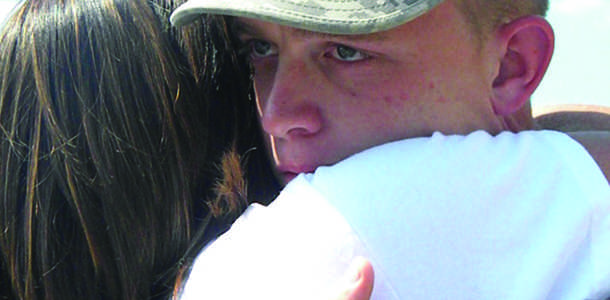A mother instinctively protects her child. But what happens when that child joins the military and is sent to Iraq? For Terri Thomas all she can do is be supportive of her son.
Terri’s son, Erik Thomas, was a sophomore at Northern Kentucky University when he was deployed to Iraq with the Kentucky National Guard 1204th Aviation Support Battalion. The battalion was honored with a departure ceremony Aug. 27 at the Bank of Kentucky Center before their deployment.
Without knowing where or when their son was going to be deployed, Terri and her husband could only hope he would be “somewhere not in the middle of all the action.” When the news of the battalion going to Iraq, Terri felt a small amount of relief knowing where he was going to be.
“You never know what is going to happen over there … it’s just the whole anxiety of not knowing what is going on, and if I don’t talk to him its even a little more anxious,” Terri said.
The base at which Erik is stationed has been mortared, on multiple occasions. Terri doesn’t like to hear about such events and refuses to listen when Erik mentions them.
“The hardest thing was hearing about the first time they were mortared, even though I know it wasn’t close. I could sense fear and anxiety in his voice as well,” Terri said. “It makes it more real when he tells us that; and emotion-wise, it’s just the fear of what is going to happen next.”
Terri isn’t alone in worrying about a loved one in the 1204th. NKU senior business administration major and women’s basketball player Stephanie Hodges’ boyfriend, Joey Ball, was deployed, as well.
“Its really hard, especially with basketball; because when I get really busy, it gets hard to focus,” Hodges said. “It’s all you can think about, everything reminds me of him.”
When Ball and Hodges talk, their conversations focus on the future and what will happen when he comes home. “It is a lot of ‘can’t wait till you get home’ and keeping things positive and try to keep each other happy,” Hodges said. “But I get sad every time he says ‘goodbye,’ because I don’t know the next time I will get to talk to him.”
When Erik decided to join the National Guard, Terri was “a little shocked.” Erik played basketball and baseball in high school and showed no interest in joining the military. “He came to me one day and decided that he was going join. He was 18 so we couldn’t tell him no. We were there to support Erik,” Terri said.
Terri first feared for Erik’s safety and well-being. Then her mind remembered a family friend who was killed five years earlier by a suicide bomber.
What keeps Terri from worrying herself too much is looking to social outlets, like Skype and Facebook, so she’s able to communicate with her son. They are able to speak with each other on a near-daily basis. Terri said she would be a “complete basket case” without the quick communication.
“We try to Skype-date at least once a week, just so I can see him and see how he is doing,” Terri said.
The two don’t say “I’ll call you tomorrow,” because if Erik doesn’t call, Terri won’t have to worry about what happened and why he didn’t call her.
Terri handles the stress and worry with the help of groups designed to support military families. Terri’s primary group with which she is involved is the Yellow Ribbon Integration Program, which helps National Guard service members and their families throughout the deployment cycle.
When Erik returns from his tour, he and Terri plan on taking a vacation together, a trip where the two can “kick back and just hang out.” Terri’s brother does plan on throwing a welcome home party. Erik’s career plans are to go back to school and either go through more training to become a warrant officer or possibly coaching.


